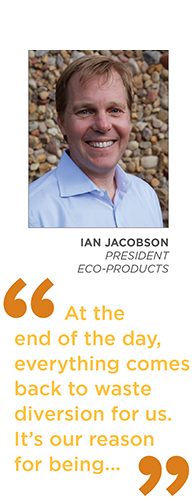Hello and welcome to the third edition of the Eco-Products Sustainability Report. When we came out with our first report in 2014, it was primarily an exercise in goal setting. While we had been measuring our carbon footprint for years leading up to that report, we hadn’t set any objectives for trying to manage those or any of our other impacts. Once we published that first set of goals, everything changed. Cross-functional groups began meeting regularly to discuss progress on goals, solve problems, and make decisions. Some of those decisions were easy, but not all of them were. The meetings and conversations that took place when the decisions were more difficult proved to be some of the most valuable in the history of this company. That’s because those decisions tend to be “gut check” type decisions that force a company to look in the mirror and accept what is in the reflection. None of that happens without a report like this in place to hold you accountable.
One of the things that stands out from this past year is that our Sustainability Maven was elected to the United States Composting Council’s Board of Directors. Keeping organics out of landfills is key to reducing greenhouse gas emissions, and we hope her contributions to this group will help that happen more often. Another highlight was the implementation of a supplier code of conduct for our manufacturing partners that triggered a new round of factory audits, only to be bolstered by a major corporate ownership development I will get to shortly. Lastly, some of you may recall that air travel contributes significantly to our operational (non-product) carbon footprint. We’re proud to report that our sales team and other travelers were able to dramatically reduce miles flown as a percentage of sales. Simply put, we sold more while flying less.
There has also been activity on the corporate ownership front, as I alluded to earlier. When our last report was published, Eco-Products was one of four divisions that collectively comprised The Waddington Group (TWG), and we still are. Last summer, TWG was acquired by Jarden Corporation, a world-class consumer products company with over 120 brands spread across a diverse mix of markets and industries. Jarden has a strong sustainability record, as evidenced by their comprehensive supplier code of conduct that we now benefit from and have begun to implement. We continue to be impressed with Jarden’s attention to sustainability, and are honored to be a part of this exciting family of brands.
At the end of the day, everything comes back to waste diversion for us. It’s our reason for being and it is reflected in our new mission statement that you will find if you keep reading. Compostable foodservice packaging is at its best when it enables the diversion of food scraps and other organic material from landfills. In order for that to happen, there has to be a systems approach that takes into account all inputs, incorporates a consistent communications strategy, and integrates with the haulers and facilities who will accept the material and turn it into an ecologically essential and economically valuable product.
That is starting to sound like the kind of circular economy we want to be a part of.
Ian Jacobson
President
Eco-Products, Inc.





